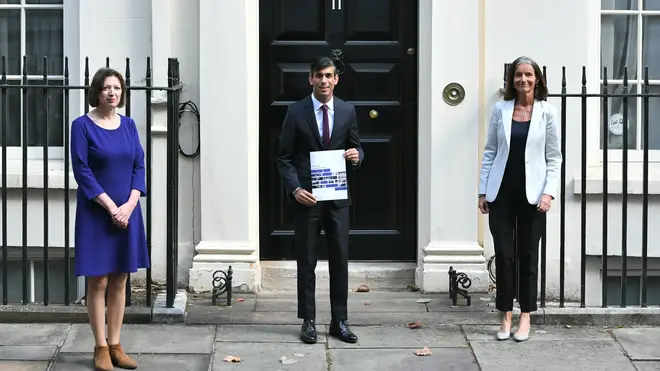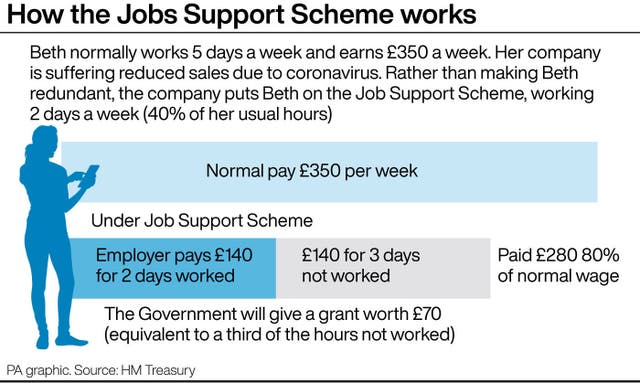
Tom Swarbrick 4pm - 6pm
24 September 2020, 15:44

The Chancellor warned that the economy may be permanently changed as a result of the pandemic.
The resurgence of coronavirus poses a threat to the UK’s “fragile” economic recovery, Rishi Sunak warned, as he confirmed plans for the state to top up the wages of workers forced to cut their hours due to the pandemic.
As part of a package of measures, the Chancellor said the new job support scheme was aimed at protecting “viable” roles rather than all posts which have been kept going as a result of state support under the furlough programme.
Under the terms of the new scheme, the Government will top up the wages of people working at least a third of their normal hours, with companies which did not take part in the furlough scheme allowed to apply.
Staff will be paid for that work as normal, with the state and employers then increasing those wages to cover two-thirds of the pay they have lost by working reduced hours.
It will cost the Treasury an estimated £300 million a month for every million workers who take up the scheme – with Government contributions per worker capped at £697.92 per month.
By comparison, the furlough scheme has cost the Government £39.3 billion – about £6 billion a month.
The Institute for Fiscal Studies (IFS) think tank warned the new Job Support Scheme was “significantly less generous” and will translate into “sharply rising unemployment”, as jobs which relied on state funding will cease to exist.
Business groups and unions welcomed the move, although there were fears that more needed to be done for future job creation and they called for more details.
From 1 November, for the next six months, the Job Support Scheme will protect viable jobs in businesses who are facing lower demand over the winter months due to Covid-19. pic.twitter.com/8NpIKpQV8y
— HM Treasury (@hmtreasury) September 24, 2020
Employers will see their own contributions towards the wages of furloughed staff rise from 20% of pay to at least 55% from November, and any employing more than 250 staff must prove they have been adversely affected by Covid.
Mr Sunak also extended the self-employment income support scheme and suggested a similar grant will be introduced, although a trade body warned more than a million could miss out on the measures.
Business loans, including the bounce back and Coronavirus Business Interruption Loan Scheme (Cbils) have been extended, with new plans due in January, and firms will have up to 10 years to pay off the debt.
About £15.45 billion has been lent under Cbils and almost 1.3 million companies have borrowed more than £38 billion through bounce back – with the taxpayer footing the vast majority of the bill for any defaults.
The struggling hospitality and tourism sector saw a cut in VAT from 20% to 5% for food, non-alcoholic drinks and accommodation extended beyond the original January 12 deadline.

The Chancellor said it will help to “support over 150,000 businesses and protect 2.4 million jobs”.
Mr Sunak delivered his plans in the House of Commons, but Prime Minister Boris Johnson was not there to support him as he was visiting police recruits in Northamptonshire.
Downing Street denied speculation about a rift at the top of Government, insisting there was “absolutely not” a problem between Mr Johnson and Mr Sunak.
The Chancellor told MPs: “The resurgence of the virus, and the measures we need to take in response, pose a threat to our fragile economic recovery.”
And he acknowledged “we can’t save every business” and “we can’t save every job”.
The Chancellor warned that the economy may be permanently changed as a result of the pandemic.
He acknowledged that people were “anxious, afraid and exhausted” at the prospect of further restrictions, but insisted there were reasons to be “cautiously optimistic” about the country’s ability to cope.
But he said that while in March it was hoped there would be a “temporary period of disruption” to the economy, it now appeared there would be a “more permanent adjustment”.
“The sources of our economic growth and the kinds of jobs we create will have to adapt to the new normal,” he said.
Measures announced by Mr Sunak included:
– The new job support scheme, which will be targeted at small and medium-sized firms, with larger companies of more than 250 employees only eligible if turnover has fallen due to the crisis.
1/ The Job Support Scheme will directly support the wages of people in work, giving businesses who face depressed winter demand the option of keeping employees in a job on shorter hours rather than making them redundant. pic.twitter.com/Gj4HRyvdUq
— Rishi Sunak (@RishiSunak) September 24, 2020
– The existing self-employed grant will be extended on similar terms and conditions as the new job support scheme.
– The temporary 15% VAT cut for tourism and hospitality will be extended until the end of March.
– A new payment scheme will give more breathing space for more than £30 billion of deferred VAT payments, allowing them to make 11 interest-free payments in 2021-22 rather than a lump sum at the end of March.
– A “pay as you grow” measure will extend the repayment terms for bounce back loans from six to 10 years.
– Firms which have taken out coronavirus business interruption loans will see the Government guarantee extended for up to 10 years.
Recover Jobs, Retrain Workers, Rebuild Business: Labour’s 3 steps to a better, more secure future for Britain.
The Chancellor's response today won't recover enough jobs. It was silent on retraining. And it had no plan to rebuild business sustainably.
It’s too little, too late.
— Anneliese Dodds (@AnnelieseDodds) September 24, 2020
– All loan schemes will be extended until the end of the year.
Mr Sunak told MPs: “Today’s measures mark an important evolution in our approach, our lives can no longer be put on hold.”
With coronavirus set to be a part of people’s lives, they must “learn to live with it” and “live without fear”, he said.
Shadow chancellor Anneliese Dodds said: “We must ensure these measures are as effective as possible at keeping workers in employment, getting unemployed people back into work and keeping viable businesses in operation.”
CBI director-general Dame Carolyn Fairbairn welcomed the “bold steps” from the Treasury and said: “Wage support, tax deferrals and help for the self-employed will reduce the scarring effect of unnecessary job losses as the UK tackles the virus.”
But she added: “Further business rates relief should remain on the table.”